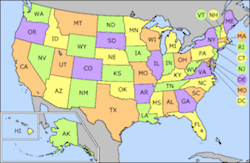Newsletter Issue 87 - May 2016
In this issue:
Special Edition: Defend Trade Secrets Act
DTSA immunization
Is state law still important?
Employment agreements to protect intellectual property
Unannounced seizure - the ultimate protection
SPECIAL EDITION: Defend Trade Secrets Act - A New Federal Cause
of Action
On May 11, 2016, President Obama signed the Defend Trade Secrets Act ("DTSA" or "Act"). The bill was largely uncontroversial (imagine that), passing the Senate by an 87-0 vote and the House by a 410-2 vote. The DTSA is an important piece of legislation. It is so important that we have decided to focus our entire issue of the LWH Newsletter on this new law. In the articles below, we will briefly explore major aspects of the Act, which:
Establishes a federal cause of action for trade secret misappropriation;
Provides for ex parte seizure of property under certain circumstances;
Provides increased damages arising from theft of trade secrets;
Gives immunity to individuals (i.e., whistle blowers) for disclosures made to federal or state authorities; and
Requires employers to give notice of the DTSA to their employees, subcontractors and consultants who have signed employment, non-disclosure, and confidentiality agreements.
So, what is a "trade secret?" The Trade Secrets Act (18 U.S.C. § 1832 et. seq.), which is amended by the DTSA, defines it as follows:
all forms and types of financial, business, scientific, technical, economic, or engineering information. . . .if - (A) the owner thereof has taken reasonable measures to keep such information secret; and (B) the information derives independent economic value, actual or potential, from not being generally known . . . .
18 USC 1839. Note that the Act, like state law, requires trade
secret owners to follow best practices in maintaining the
confidentiality of the secrets. This is important if you want to
avail yourself of the benefits of the DTSA.
The DTSA also adds significant new tools to the intellectual
property lawyer's kit. Perhaps, the most obvious is that it creates
a right to sue for misappropriation of trade secrets in federal
court. This is significant because remedies under the Act may exceed
those provided by state trade secret laws. The DTSA provides for
criminal and civil remedies. For civil actions, the Act provides
injunctive relief, actual damages, unjust enrichment damages, or
reasonable royalties (18 U.S.C. § 1836). The Act also provides
double damages and attorneys fees for willful and malicious conduct.
Just like copyright litigation, in which litigants may recover
attorneys fees, there will be little downside to pursuing trade
secret thieves in federal court.
Learn more about the DTSA in the following articles.
Ask Dr. Copyright ... DTSA Immunization
Dear Doc:
When I joined MegaCorp, I was "asked" (well, told, actually) to sign
a nondisclosure agreement that limits what I can do with any trade
secrets I may learn while doing my job. That agreement says that I
can't tell a single, solitary soul, and that if I do, MegaCorp will,
I guess, come and take my first-born child. I guess that would be OK
because (a) he's a teenager, and you know how they are; and (b)
MegaCorp would then have to put him through college, and that's a
lot of money. Here's the thing, though...If I thought that MegaCorp
was doing something illegal, and I had to tell the cops, or a lawyer
about it, I would hate to lose Junior. Can you help?
Signed,
A Fellow Currently Residing in Moscow
Dear Ed:
You're in luck...sort of. You see, as part of the new Defend Trade
Secrets Act of 2016 ("DTSA"), there are protections for
"whistle-blowers" who disclose trade secrets under certain
circumstances (18 U.S.C. §1833). The DTSA immunizes you from
liability under federal and state trade secret laws if you disclose
trade secrets in confidence to government officials and attorneys,
"solely for the purpose of reporting or investigating a suspected
violation of law." In addition, employers and contracting parties
must provide actual notice of these provisions in any contract
governing, "the use of a trade secret or other confidential
information." If they fail to give this notice, then they cannot
seek exemplary damages or attorney's fees in litigation against
former employees and contractors (but they can still bring a law
suit.) If MegaCorp were to sue you in retaliation for reporting that
they violated the law, you would also be entitled to use their trade
secrets in your court filings, if you filed them "under seal"
(meaning that the judge and lawyers can read them, but not anyone
else unless the judge so-orders.)
So you see, Ed, you've got some protection under the new law, but
like anything in the legal field, it has some gray areas (though
maybe not 50 shades of them.) Now...about those massive databases...
If you're an employer and your employment agreements and contacts
don't contain the required notice under the DTSA, give the attorneys
at LW&H a call. They can fix 'em right up.
The "Doc"
Is State Law Still Important after the Defend Trade Secrets Act?
Trade secret owners have new Federal rights under the Defend
Trade Secrets Act. But what about state law? Is state law still
important for trade secret protection?
You bet state law is still important.
Trade secret owners have the same state trade secret rights that
they had before the DTSA. Whenever a trade secret owner files suit
in Federal court to assert the new Federal trade secret rights, the
owner also will assert state trade secret rights. The trade secret
owner will use the Federal courts to enforce state trade secret law.
The essential difference between Federal and state laws is that
state laws vary from state to state. Let's consider how different
states treat the most common type of actual or feared trade secret
disclosure - where a key employee with knowledge of valuable trade
secrets takes a similar job with a competitor.
In some states, protection of trade secrets is more important than
employee mobility. In those states, an employer can block a former
employee from taking a job with a competitor where the nature of the
employee's new job would cause the 'inevitable disclosure' of the
employer's trade secrets to the competitor. States that have applied
'inevitable disclosure' to block an employee from taking a new job
include Pennsylvania, Delaware, New York and New Jersey.
Other states view employee mobility as more important than trade
secrets and refuse to apply 'inevitable disclosure' to prevent the
former employee from taking a new job. States that reject
'inevitable disclosure' include Maryland, Connecticut and
California.
The Federal Defend Trade Secrets Act predictably lands between the
two competing positions on the subject of 'inevitable disclosure.'
In this instance, state law can be more powerful than Federal law.
The cautious employer who owns trade secrets will structure its
employment agreements to improve the chances of success under state
law as well as Federal law.
Employment Agreements to Protect Intellectual Property
How do you, the cautious employer, protect yourself from trade
secret theft? One way is through employment agreements. Many of the
court cases involving employee theft of trade secrets include
employment agreements with intellectual property terms. We believe
that courts are more likely to conclude that the actions by a former
employee are or will be a misappropriation of trade secrets if
employment agreements are in place that include terms to protect
those trade secrets. Since many employers use non-employee
independent contractors, the contracts for those non-employee
contractors can include similar terms.
1. Include a non-disclosure clause in your employment agreement. A
non-disclosure clause is a commitment from the employee to keep your
trade secrets secret. At a bare minimum, each employment agreement
should include a non-disclosure clause.
2. For an employee who is engaged in research, engineering or the
creation of new products or ideas, the employment agreement should
specify that the employee presently assigns, at the time of the
employment agreement, the employee's future rights, including patent
rights, to any inventions or other intellectual property that the
employee creates during the period of employment and that relate to
the employee's work or to your business. While this is not a trade
secret issue, it is an intellectual property issue. A present
assignment of future inventions can prevent endless headaches later,
when an inventor of a valuable product leaves without assigning the
invention to your business.
3. How will you know about your employee's inventions? Include a
contract term that the employee is obligated to report the
employee's inventions relating to the employee's work or to your
business.
4. In jurisdictions that allow it and if the labor market will
support it, consider a non-compete clause. A non-compete clause is a
contract term by which the employee agrees not to compete with your
business, usually for a specified period of time after leaving your
employ. Pennsylvania allows non-compete clauses, but not all states
do. Non-compete clauses are not appropriate for all employees and
the courts will not enforce the non-compete clause if the
restrictions on the employee are unreasonable - indentured servitude
has passed out of fashion.
5. The employment agreement should include the Defend Trade Secrets
Act notices mentioned elsewhere in this newsletter. The notices
increase the remedies available to the employer.
Do your employment agreements and contracts need a polish after the
Defend Trade Secrets Act? We are happy to help.
Unannounced Seizure - The Ultimate Protection
Trade secret owners have a powerful new remedy to protect their
stolen trade secrets, one that is not generally available in civil
actions. The Defend Trade Secrets Act (DTSA) provides a right for
the trade secret owner to ask the court for an ex parte order to
seize property (18 U.S.C. § 1836). Ex parte means that the trade
secret owner, without notifying the possessor of the stolen trade
secret, can alone ask the court to order seizure of property
containing the stolen trade secret. This procedure is one of a very
few where a court need not hear from both parties to a dispute
before acting.
If the ability to seek a court ordered injunction against the use or
dissemination of a trade secret is a hammer provided trade secret
owners, the ability of a trade secret owner to go to court ex parte
is the sledge hammer provided in the new statute. Seizure would be
effected by having federal or local law enforcement officials enter
and take possession of and secure the seized material from physical
or electronic access including, if necessary, breaking entry locks
to achieve access. The situations in which such a drastic remedy
would likely be used might involve among others the imminent
disclosure of the trade secret such as through sale of goods,
publication of the trade secret, or dissemination of information
describing or containing the trade secret. Once seized, no one has a
right to the property until permitted by the court .
Since this remedy is so drastic, the standards the trade secret
owner applicant must meet are set accordingly high before the court
will issue a seizure order. The applicant must allege that: other
forms of relief such, as an injunction, would be inadequate; there
would be immediate harm to the applicant if seizure is not ordered;
the information is a trade secret; the trade secret was
misappropriated by improper means; the person against whom the
seizure order will issue has possession of the trade secret and any
property to be seized; the applicant can describe the matter to be
seized and its location; and if the person against whom the seizure
order will issue would make the matter inaccessible if that person
would have notice of the application to the court.
To protect the rights of the person against whom the seizure order
is issued, the DTSA requires that the court set a hearing as soon as
possible but no later than 7 days after the seizure order issued. At
the hearing, the applicant must prove the facts supporting the
application for the seizure order, and, if not, the order will be
dissolved. The person against whom the order is issued may argue
that it was improper and ask the court to dissolve the order. In
addition, the court can require the applicant to provide security
for the payment of any damages that any person may be entitled to as
a result of a wrongful or excessive seizure.
In short, trade secret owners have a powerful new seizure tool that
must be used with great care.

